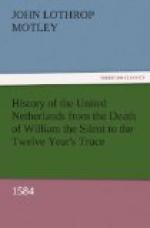If then England were out of the, question, where, except in France, should the Netherlanders, not deeming themselves capable of standing alone, seek for protection and support?
We have seen the extensive and almost ubiquitous power of Spain. Where she did not command as sovereign, she was almost equally formidable as an ally. The Emperor of Germany was the nephew and the brother-in-law of Philip, and a strict Catholic besides. Little aid was to be expected from him or the lands under his control for the cause of the Netherland revolt. Rudolph hated his brother-in-law, but lived in mortal fear of him. He was also in perpetual dread of the Grand Turk. That formidable potentate, not then the “sick man” whose precarious condition and territorial inheritance cause so much anxiety in modern days, was, it is true, sufficiently occupied for the moment in Persia, and had been sustaining there a series of sanguinary defeats. He was all the more anxious to remain upon good terms with Philip, and had recently sent him a complimentary embassy, together with some rather choice presents, among which were “four lions, twelve unicorns, and two horses coloured white, black, and blue.” Notwithstanding these pacific manifestations towards the West, however, and in spite of the truce with the German Empire which the Turk had just renewed for nine years,—Rudolph and his servants still trembled at every report from the East.
“He is much deceived,” wrote Busbecq, Rudolph’s ambassador in Paris, “who doubts that the Turk has sought any thing by this long Persian war, but to protect his back, and prepare the way, after subduing that enemy, to the extermination of all Christendom, and that he will then, with all his might, wage an unequal warfare with us, in which the existence of the Empire will be at stake.”
The envoy expressed, at the same period, however, still greater awe of Spain. “It is to no one,” he wrote, “endowed with good judgment, in the least obscure, that the Spanish nation, greedy of empire, will never be quiet, even with their great power, but will seek for the dominion of the rest of Christendom. How much remains beyond what they have already acquired? Afterwards, there will soon be no liberty, no dignity, for other princes and republics. That single nation will be arbiter of all things, than which nothing can be more miserable, nothing more degrading. It cannot be doubted that all kings, princes, and states, whose safety or dignity is dear to them, would willingly associate in arms to extinguish the common conflagration. The death of the Catholic king would seem the great opportunity ’miscendis rebus’.”




